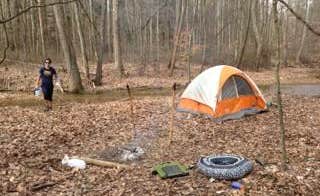Rustic camping near Louisville, Kentucky provides opportunities for primitive outdoor experiences with minimal facilities. The region features rolling hills with elevation changes up to 300 feet and mixed hardwood forests dominated by oak, hickory, and maple trees. Most dispersed sites require campers to be completely self-sufficient, with no trash service or bathroom facilities available during summer drought conditions.
What to do
Hiking challenge trails: The Knobstone Trail offers rugged terrain with significant elevation changes. "The KT is rugged and has lots of elevation gains over short distances. Everywhere you hike there are lovely vistas and lots of fossils on the trail and creek beds," notes Maris H. about Knobstone Trail.
Water source identification: During warmer months, locate reliable water supplies before setting up camp. "You're never too far from water, although the quality may differ depending on the time of year," explains a Knobstone Trail reviewer, adding that summer and fall typically have less available water.
Wildlife observation: Bring binoculars for spotting native birds and mammals from a safe distance. The forests contain diverse wildlife requiring proper food storage techniques to prevent unwanted encounters.
What campers like
Natural isolation: Finding secluded spots away from crowds provides true backcountry experiences. "There are campsites along the trail just have to find them," explains loganx11 about Jackson Trailhead, indicating the reward for those willing to explore beyond obvious locations.
Challenging terrain: Experienced backpackers appreciate the physical demands of the area. "Most people, even Hoosiers don't realize the Knobstone Trail exists. It's often referred to as The Little AT by those who know about it. It's no walk in the park," shares Dave E., highlighting the satisfying difficulty level.
Fossil discoveries: Creek beds and exposed rock formations contain marine fossils for amateur geologists to examine. "There are lovely vistas and lots of fossils on the trail and creek beds," reports a Knobstone Trail visitor, pointing to educational opportunities beyond basic camping.
What you should know
Access challenges: Some primitive camping areas have limited entry points or unclear signage. "Maybe Google Maps took me to the wrong place. I drove back and forth on the road several times looking for this place. The only thing I found was what I believe was the entrance with a cable across it," cautions Desert B. about their experience trying to find primitive camping near Louisville.
Vehicle limitations: Most access roads require high-clearance vehicles or hiking to reach campsites. "There's parking after a decrepit gravel road and suitable for camping," notes a Jackson Trailhead reviewer, indicating the rough road conditions.
Tick prevention: The region has significant tick populations, especially in spring and early summer. "Watch out for ticks. My dogs and I got loads of them in April from Leota to Spurgeon Hollow," warns a Knobstone Trail visitor, suggesting thorough body checks and repellent use.
Tips for camping with families
Site selection priorities: Choose locations with natural boundaries to define your camp area. "The sites are spacious, and there are a lot of nature things to do," recommends Susan C. about Knobstone Trail, highlighting the importance of adequate space.
Communication plan: Cell service is unreliable in many rustic camping areas. "Let someone know your itinerary, have a means for filtering water, and enjoy!" advises a backpacker, emphasizing safety protocols when camping with children.
Nature activities: Pack field guides for plant and fossil identification to create educational experiences. "There are lovely vistas and lots of fossils on the trail and creek beds," notes a camper, indicating natural learning opportunities.
Tips from RVers
Site restrictions: Most primitive camping near Louisville cannot accommodate larger recreational vehicles. "There was no place to park otherwise," reports a visitor attempting to access a trailhead, indicating the lack of RV-suitable parking.
Self-containment requirements: For areas permitting smaller RVs, prepare for no hookup availability. Bring sufficient water, waste storage capacity, and power sources for your entire stay.
Road condition awareness: Many access roads have ruts, loose gravel, or low clearance points. "There's parking after a decrepit gravel road," warns a Jackson Trailhead visitor, suggesting careful route planning for even small RVs or trailers.


